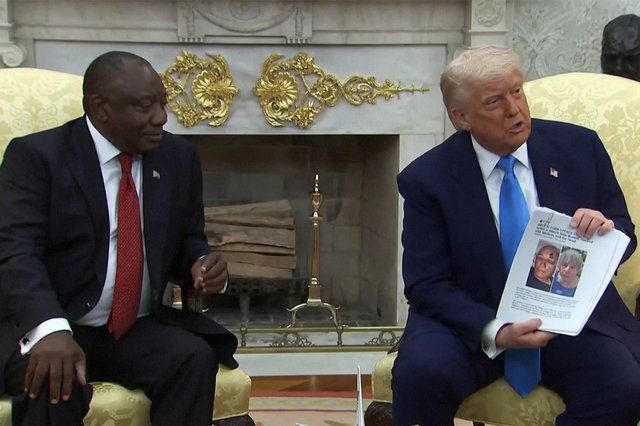During a meeting with South African President Cyril Ramaphosa, US President Donald Trump presented what he claimed was evidence of a “white genocide” in South Africa. He showed video footage of white crosses along a highway and a photograph of body bags, wrongly stating that these represented burial sites for murdered white farmers. However, our investigation shows that these claims are false.
The white crosses: A Symbol, not burial sites
Trump shared a video of a line of white crosses on a road. He claimed these marked the burial sites of murdered white farmers, saying “over a thousand” farmers had been killed. In reality, these crosses were part of a symbolic memorial created during a 2020 protest. The protest was in response to the murder of a white farming couple and farm attacks in general. The crosses were not burial sites, and they have since been removed.
The protest took place near Newcastle in KwaZulu-Natal after Glenn and Vida Rafferty were killed on their farm. Both black and white South Africans participated. They called for an end to all farm murders, regardless of the victims’ race. Darrell Brown, one of the organisers, explained that the crosses represented nearly 500 farmers who had been killed over several years.
The body bag photograph: not from South Africa
Trump also showed a photograph of body bags, claiming they contained the bodies of murdered white farmers in South Africa. However, this image came from the Democratic Republic of Congo, not South Africa. It was taken during a 2025 attack in Goma, a city attacked by M23 rebels. Reuters confirmed the photo was from this incident, not a South African farm attack.
This image was often shared on social media, linked to the false narrative of a “white genocide” in South Africa. But it was never connected to the country.
The reality of farm murders in South Africa
Farm murders are a concern in South Africa, but they are part of a wider issue of violent crime, not a targeted campaign against white farmers. The South African government has acknowledged the problem, and both black and white South Africans have spoken out against the violence. Data from the Transvaal Agricultural Union shows 2,229 farm murders between 1990 and 2024. Of these, 1,363 victims were white farmers, and the rest were black farmers and their families.
Even though white people own most commercial farmland in South Africa, the number of murders involving white people is low compared to the total number of homicides. In 2017-2018, only 62 farm murders occurred out of more than 20,000 murders nationwide. Most victims of violent crime in South Africa are black.
Experts explain that farm murders result from crime linked to the isolation of farms, not racial persecution. Gareth Newham of the Institute of Security Studies stated that there is no evidence of coordinated violence against farmers for political reasons.
What Trump’s claims missed
In his meeting with Ramaphosa, Trump used misleading evidence to claim that South Africa was engaged in a “white genocide.” However, Ramaphosa and his government argued that the real issue was high crime rates across the country. They sought international help to tackle this problem.
The South African government has recognised the challenge of rural crime. Local protests, such as the one in 2020, have called for an end to all farm murders, regardless of race.
Trump’s claims about “white genocide” in South Africa are based on false or misleading evidence. While farm murders are a real issue, they do not support the idea of a systematic campaign of racial violence. It is important to understand the broader context of crime in the country rather than rely on divisive and misleading claims.
